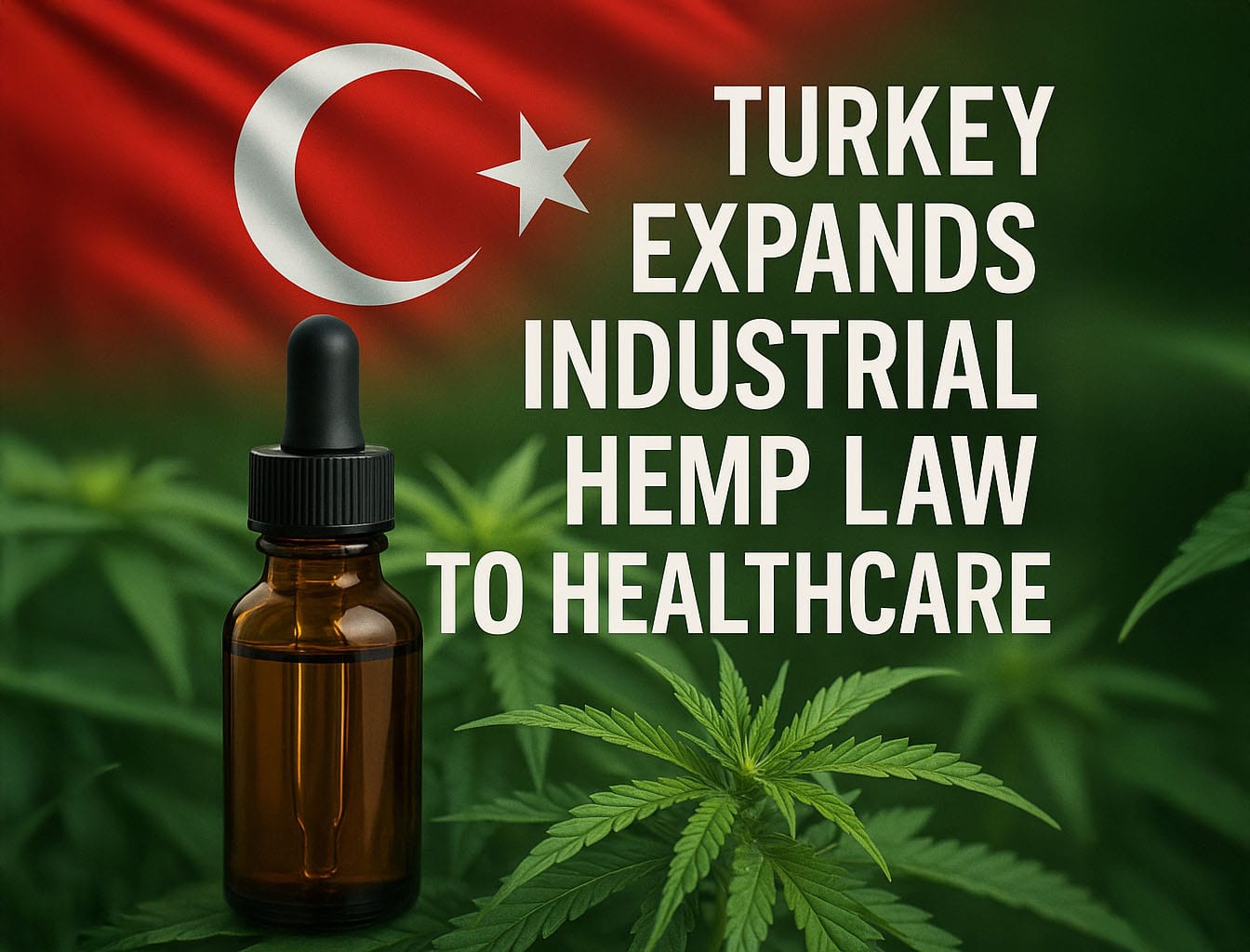
Blog
Turkey Expands Industrial Hemp Law to Healthcare

Introduction
Turkey is reshaping its hemp policy. The government decided to extend existing legislation, which initially focused on industrial applications, into the healthcare sector. This move shows the country’s ambition to unlock hemp’s broader potential while keeping tight regulation in place.
Hemp in Turkey: From Tradition to Modern Policy
Hemp has deep roots in Turkey’s history. For centuries, farmers grew the crop for rope, textiles, and traditional crafts. During the 20th century, however, cultivation declined sharply as global drug policies created stigma around the plant.
In recent years, Turkey started reviving hemp cultivation as part of a strategy to strengthen agriculture and industry. Authorities encouraged production mainly for:
- Biodegradable textiles
- Paper and packaging
- Hempcrete and other sustainable construction materials
- Natural fiber composites and animal feed
By focusing on these areas, policymakers aimed to diversify rural economies and reduce reliance on imported raw materials.
A New Healthcare Dimension
Now, Turkey is broadening hemp’s role. Instead of treating it solely as an industrial crop, the government is opening the door to healthcare and research.
This expansion allows for:
- Medical research: Universities and laboratories can study hemp-derived compounds more freely.
- Pharmaceutical development: Companies may create medicines under medical supervision and strict licensing.
- Healthcare products: Producers gain opportunities to design regulated wellness items based on hemp.
Importantly, this framework emphasizes control and compliance. Authorities will oversee licenses, product standards, and health regulations to ensure responsible use.
Hemp in Healthcare: A Global Trend
Turkey’s reform does not stand alone. Other nations have followed a similar path, showing that hemp’s integration into healthcare reflects a worldwide trend.
- In the European Union, hemp cultivation is supported under the Common Agricultural Policy. The European Commission Novel Food Catalogue also outlines conditions for hemp-derived food and cosmetic ingredients.
- In the United States, the 2018 Farm Bill legalized industrial hemp, opening the door to large-scale research and product development.
- In Canada, the Cannabis Act regulates hemp for food, health products, and pharmaceuticals.
- In Thailand, reforms in 2019 enabled hemp’s integration into both traditional medicine and modern healthcare.
These examples highlight how governments worldwide are exploring hemp’s role in medicine, wellness, and scientific research.
Scientific Evidence on Hemp in Healthcare
The growing interest in hemp comes with a rising body of research:
- A review in Frontiers in Pharmacology discusses hemp as a source of bioactive compounds with antioxidant and anti-inflammatory potential (source).
- Research published in Molecules identifies hemp seeds as rich in essential fatty acids and polyphenols, which could support nutritional and therapeutic uses (source).
- The World Health Organization (WHO) has acknowledged scientific interest in hemp-derived cannabinoids, while stressing the importance of regulation and safety (source).
Although these studies are promising, experts underline the need for more human trials before drawing firm medical conclusions.
Opportunities and Challenges for Turkey
Turkey’s expansion into healthcare offers several clear opportunities:
- Economic growth: Farmers and manufacturers could tap into new domestic and international markets.
- Research leadership: Universities and medical institutions may expand their role in hemp science.
- Global positioning: Turkey can align itself with countries at the forefront of hemp innovation.
Nevertheless, challenges remain. Healthcare applications require strict product standards, clinical testing, and transparent licensing. Without careful oversight, credibility and safety could be compromised.
Looking Ahead
By extending its hemp law into healthcare, Turkey is signaling a forward-looking approach. The country has already benefited from hemp’s role in textiles and construction. Now, it stands ready to explore healthcare applications that could boost research, innovation, and sustainable growth.
However, the path forward depends on implementation. Effective regulations, high-quality research, and strong enforcement will determine whether Turkey succeeds in balancing economic potential with public health.
FAQ
1. Why is Turkey expanding hemp laws to healthcare?
The government aims to promote scientific research, medical development, and new economic opportunities while ensuring regulatory oversight.
2. How does Turkey’s approach compare globally?
Many countries, including the EU, USA, and Canada, have integrated hemp into healthcare. Turkey’s move reflects this global shift.
3. What safeguards are in place?
Authorities will enforce licensing, compliance, and product standards to ensure that hemp use in healthcare remains safe and controlled.
4. What does research say about hemp in health?
Studies highlight hemp’s potential for nutritional and therapeutic uses, but experts agree more clinical trials are needed before making definitive claims.
Disclaimer: This blog is for informational and educational purposes only. We review and reference available studies and reputable sources; however, content may not reflect the most current research or regulations and should not be taken as medical, legal, or professional advice. We do not make or imply health claims. Products mentioned are not intended to diagnose, treat, cure, or prevent any disease and statements have not been evaluated by EFSA or the FDA. Effects can vary between individuals. Always consult a qualified healthcare professional before use and verify that any product or ingredient is lawful in your jurisdiction.



